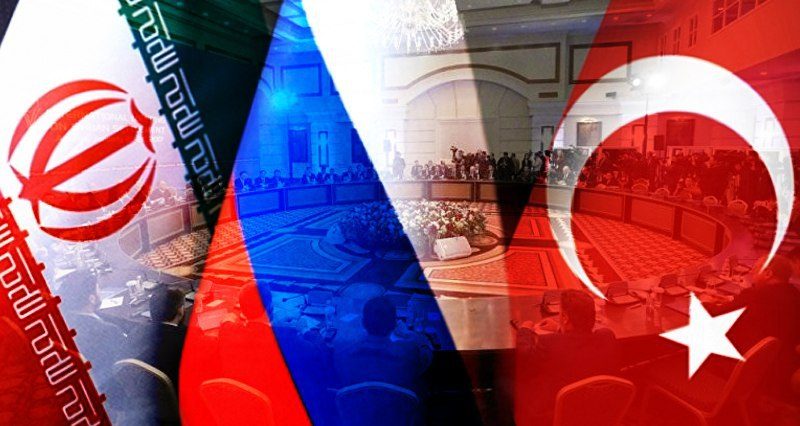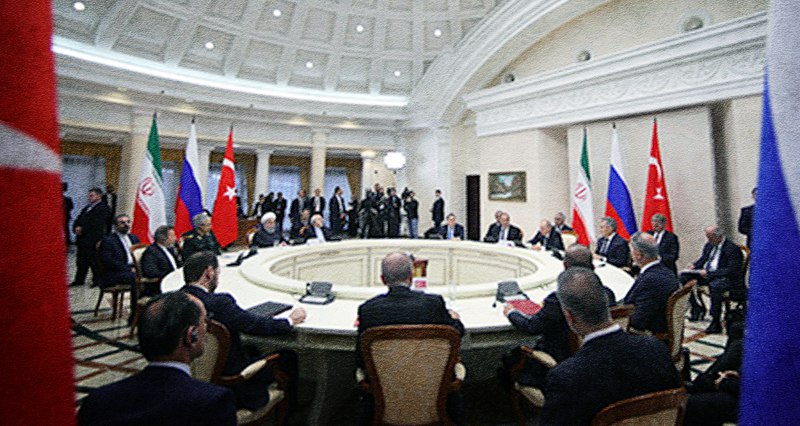Two weeks ago, the first virtual summit of the Astana Process hosted by Iranian President Hassan Rouhani was held. Prior to the meeting, the Deputy Foreign Ministers of Turkey, Russia and Iran have already held another virtual summit to reach a draft version of the joint statement.
The summit ended by releasing a joint statement of 14 articles by the three countries all emphasizing continuation of constructive activities to reach a better situation in Syria, as well as moving forward to a permanent settlement of the crisis.
“Preserving Syrian territorial integrity, respecting the country’s Independence and national sovereignty, as well as determining the fate of Syria just by its people through inter-Syrian dialogues rather than foreign intervention” are among “Iran’s immutable principles in the Syrian issue”, said Rouhani. It could be interpreted that Iran and the two other partners of the Astana Process are looking to move in the next steps toward strengthening the political space and establishing a new constitutional committee, as well as improving the idea of de-escalation regions.
It seems that Iran is trying to provide the basis for inter-Syrian talks in a terrorist-free atmosphere. This can become possible by removing the terrorist groups operating in Syrian battlefield, stopping the support from behind the curtain, and ensuring the withdrawal of foreign forces. Iran called American forces “terrorists” and considers them as a key obstacle against the peace in Syria. From Tehran’s point of view, a stable regional peace will not be possible as long as the US benefits from the Middle East crisis. Hence, a US withdrawal from the Middle East is key prior to any other solution.
Iranian media positively covered the summit and the three Presidents’ speeches, and described the results of negotiations and the decisions as a growth toward peace. The media widely employed a positive tone regarding the statements of Rouhani, Erdogan and Putin.

The Astana Process as a platform for constructive cooperation
It seems that Iran is trying to turn the Astana Process into a basic platform for constructive cooperation between the regional powers. Tehran believes that if the countries engaged in the Astana process can collaborate around the Syrian crisis – one of the most complex crises of recent decades in the region- and move toward positive developments, they can move onto more constructive steps on other regional and global issues.
The Astana process stated at the same time that the Syrian issue had become an unbreakable knot. The initiative established a process for peace and a ceasefire in the negotiated regions for the first time and proved that the regional cooperation could be much more constructive than the military intervention of transnational powers such as the US and the NATO due to the mutual interests, a proper understanding of the issues and strategic views based on interdependent interests.
At the same time, we have witnessed Iran’s bilateral trade with Russia and Turkey through local currencies and simultaneously pursued political cooperation.
An effort to create a mechanism to neutralize the weaponizing of sanctions
On the other hand, by emphasizing its non-recognition of sanctions against the legitimate government of Syria, Iran reiterated efforts to neutralize sanctions weapons against countries of the anti-imperialist faction, those resisting European-American plans. Iran has already shown the potential for creating the necessary mechanisms to neutralize the weapons of sanctions in its cooperation with Russia, Qatar and Venezuela. Tehran believes that Washington is going to reach the goals it failed to achieve through military pressure and by means of terrorist groups, by imposing inhumane sanctions. However, Tehran will continue to cooperate with Damascus in the field of sanctions, just as the two collaborated in the field of military activities against terrorists.
The Syrian government also optimistically views the Astana process, and is ready to spearhead initiatives to establish the peace in the country. Previously, at the same time that the Tehran Summit was held, the Syrian Foreign ministry issued a statement about the conference in Brussels, criticizing the ongoing efforts of the US, EU and affiliated organizations for intervention in the country’s internal affairs. “The positions taken at the Brussels conference shows that the United States, the European Union and their affiliates continue their hostile policies against Syria”, the statement said.
The statement also condemned all the conferences such as Brussel and emphasized “Damascus considers the conference as blatant interference in Syria’s internal affairs and the affairs that are up to the Syrian people and its legitimate government to decide on them”. Meanwhile, Damascus has refrained from commenting negatively on the Astana process and tries to conduct its military operations against terrorists in coordination with the decisions made in Astana.
The next summit of Iran, Russia and Turkey will be held face-to-face in Tehran and obviously, Iran’s view toward the issue has a significant impact on its continuity. Therefore, consensus among the political factions inside the country can be a point of hope for the continuation of Iran’s constructive cooperation in the Astana process. Hopefully, things will turn out as Iran’s Foreign Minister Mohammad Javad Zarif wrote on his twitter in light of the process, that “Peace in Syria will be achieved.”

















Leave a Reply